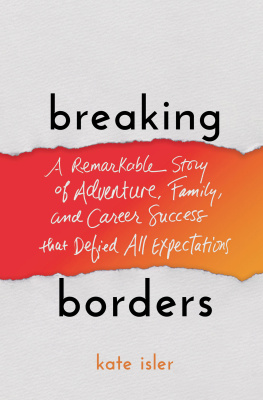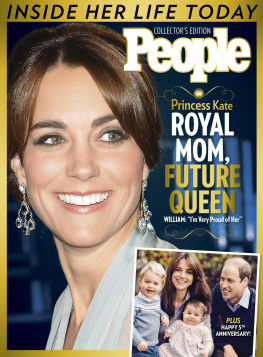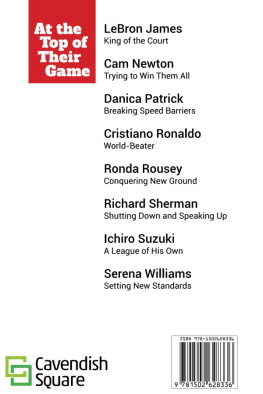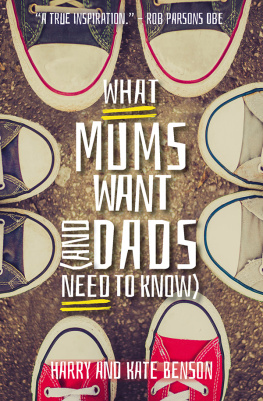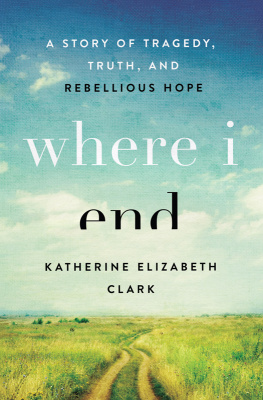2021 Kate Isler
All rights reserved. No portion of this book may be reproduced, stored in a retrieval system, or transmitted in any form or by any meanselectronic, mechanical, photocopy, recording, scanning, or otherexcept for brief quotations in critical reviews or articles, without the prior written permission of the publisher.
Published by HarperCollins Leadership, an imprint of HarperCollins Focus LLC.
Any internet addresses, phone numbers, or company or product information printed in this book are offered as a resource and are not intended in any way to be or to imply an endorsement by HarperCollins Leadership, nor does HarperCollins Leadership vouch for the existence, content, or services of these sites, phone numbers, companies, or products beyond the life of this book.
ISBN 978-1-4002-2157-8 (eBook)
ISBN 978-1-4002-2156-1 (PBK)
Epub Edition December 2020 9781400221578
Library of Congress Control Number: 2020951051
Printed in the United States of America
20 21 22 23 LSC 10 9 8 7 6 5 4 3 2 1
This book is dedicated to my Council. In addition to the love and support from Doug and the boys, I am fortunate to have a group of BOLD women around me that have generously shared their feedback, insights, love, and my passion for getting this story told. My Council sisters (biological and soul) help guide me, offer input, a hand to hold when I am down, and raise their voices in celebration along with me. My Council enriches my life every day. I cherish and thank them.
Everyone needs a Council in their lives!
contents
Guide
I AM NOT A SEATTLE NATIVE. I have a hard time determining where I am from. My father was a Holiday Inn manager; his official title was Inn Keeper. An Inn Keeper meant that he ran hotel operations from top to bottom, was on call 24/7, and required the Inn Keepers family to live on the property. The family consisted of my mother, my sister, and occasionally one of my half brothers. My sister and I are thirty-two months apart, whereas with my two half brothers, one is eleven years my senior and the other is thirteen years older. We were not a close family; I dont remember my older brothers around much other than summer visits. For the most part, it was my sister and me with my parents.
When my sister, Karen, and I were very young, home was a suite or a collection of adjoining rooms and a small kitchenette in the Holiday Inn property our father was running at the time. The configuration of our living space was a straight line starting with my parents room and ending with my sisters; mine was in the middle. The inevitable result of occupying an adjoining middle room was that it became a hallway to Karens room. My sister and I were not close, growing up. Karen played by the rules. She was interested in boys, dressing nicely, and making good grades. I had an electronic race car track on the floor of my room, preferred kickball at recess over any type of academics, and was never really clear on the need for rules. We vied for our parents attention and fought over everythingI was always exasperated by her constant presence passing through my room on the way to hers.
For many, the description of living in a hotel suite conjures up the vision of Eloise at the Plaza in New York; this was not my experience. Our unusual living arrangement was supplemented by full access to the restaurants and housekeeping. In all cases, we lived in motel-style properties that meant the door opened to the outside, and there was at least one swimming pool. In some ways, this was a kids dream: one or two pools at my disposal and unlimited French fries via room service. I caught the school bus each morning, standing below the iconic Holiday Inn sign.
There was a significant downside for children to living in a commercial establishment. My sister and I went to public schools and had friends, just as other kids did; however, there were few after-school play dates at our house. Most parents had reservations about letting their children come to play at a motel. Birthday parties were always the hardest. When I was turning eight, like most kids, my birthday and Christmas were the most significant two days of the year. I started planning my birthday party weeks in advance, making a list of everyone in my class to invite, games to play, and the flavor of cake I wanted. However, when my birthday finally arrived, only one of my classmates, Amy Paul, was able to come to the party. We received several thank you, but we dont feel comfortable having our child in a hotel dining room for a party responses. Like most of our birthday celebrations, this one ended up being Amy, my family, and a variety of hotel staff sharing a cake quietly in the dining room before the dinner rush.
The unease that parents felt about letting their children visit a hotel for a play date was exacerbated by the fact that we moved to a new city and a new property every few years, so we were always the new family. Parents had little context or history about us and so were hesitant to let their children spend the afternoon or sleep over at a public place. In the first ten years of my life, I lived in six cities. I mastered meeting new people, adapting and adjusting to new situations, and making friends quickly early in life as a survival skill.
By the end of seventh grade, we were living in Albuquerque, and my parents were divorced. My mother announced she was getting married again. She had been introduced to Paul a few months before and was moving us to Salt Lake City to live with him and his two children. As we started the well-practiced process of packing and saying our goodbyes to friends, the nuptials fell apart. The marriage only lasted a matter of weeks, but the embarrassment was too much for my mother to recover her dignity. She was determined to move anyway, so she adjusted the destination, and we went on packing. Our new address would be Colorado Springs, where we had lived for a short period a few years before. My mother had friends she felt comfortable with, so we loaded up the moving van, and off we went.
My father continued to live in our rooms at the hotel in Albuquerque and was still very present in our lives. There was no love lost between my parents, and by all accounts, it was a messy divorce. My father was the consummate Inn Keeper: charming, engaging, with curly hair and a deep dimple in his right cheek. He had a twinkle in his eye and spoke with a southern drawl that was still prevalent twenty-plus years after he left Mississippi. Everyone loved Louis. He seemed to know everyone and make friends easily. I was too young to remember the details, but I remember my parents relationship as tense, adversarial. On a few occasions, it erupted into physical fights.
The First Taste of Independence
I was never without as a child. I had enough food, warm clothes, and a place to live. But once we moved out of the motel, there were few frills. A single mother without a college degree, going back to work after raising children, was an awkward position from which to command a top salary. I was a latch key kid. Latch key was the term used in the 1970s to describe a growing population of kids whose parents both worked outside of the home. Children arrived home from school before the end of their parents workday, let themselves into the house, and latched the door behind them. We were the first generation of children to gain after-school independence. To me, this was neither good nor bad. It was my life, an experience I had in common with several friends. Once school was out, I would go home and do homework, review the days gossip on the phone, and watch sitcoms on TV until dinnertime. Living in an apartment with a single mother put me squarely in the ordinary category among kids at the time. The latch key status was my first taste of independence and self-reliance, and it felt great.
Next page
